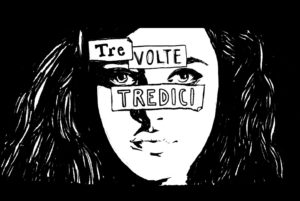Winter, the new novel by Ali Smith, is coming out today, and for the occasion me and Marzia wanted to remember a brief encounter we had last summer, in Rome, with our favourite scottish author. The interview was originally published in the September issue of “Il Mucchio”, and was translated from english into italian. You can find both versions in this post, scrolling down.
Oggi esce Winter, il nuovo romanzo di Ali Smith, e per l’occasione io e Marzia volevamo ricordare un breve incontro che abbiamo avuto a Roma, l’estate scorsa, con la nostra autrice scozzese preferita. L’intervista è stata originariamente pubblicata nel numero di settembre del “Mucchio”, ed è stata tradotta dall’inglese all’italiano. In questo post, potrete trovare entrambe le versioni scorrendo verso il basso.
• From Hotel World to How to Be Both – including The Accidental, with Eve’s books – we discover lively characters who are somehow “ghosts”.
Virginia Woolf wrote: “It’s harder to kill a phantom than a reality”. Could that be the reason why people seemingly “resurrect” in your novels?
AS: I don’t think there’s such a thing as ghosts. I think if we’re haunted it’s maybe largely by lifeforce – complex, mysterious, primal and questioning – and something, unlike us, that will definitely never ever die.
• The Italian translation for one of the words at the core of your novels – “guest” – is “ospite”. I’ve always found it to be fascinating that in the italian language, this word is a blatant example of auto-antonym. “Ospite”, in fact, stands at the same time for “host” and “guest”: two opposing meanings. In The Accidental and perhaps even more in There but for the, you introduce a more complex variation on this theme: the uninvited guest. How would you define the boundaries of the concept of hospitality?
AS: There are none, in storytelling, no boundaries. It’s always about the act of welcome. In the world, of course, there are borders – because material power is always about exclusivity. In story, though, power is inclusivity.
It’s why we need story more than ever, to remind us in a more and more bordered and material world to open up, to be opened, and to give and to receive, both.
• In The Accidental, a teenage girl commits suicide owing to a casual act of cruelty from her schoolmates. The Netflix series 13 Reasons Why has the viewers debate a similar subject. Indeed, some commentators perceive the depiction and characterisation of the culprits as being too harsh.
What about Magnus? Does he really come to terms with what he had done, at the end of your novel, or is he still shocked because everybody seems eager to condone it?
AS: You tell me.
• So much of your writing revolves round metaphors, quotes, rhymes and vertiginous puns. One of my favourites is in There but for the: Brooke, the brilliant girl who holds the plot together, gets teased for her precocious intelligence and has to learn how to live in the rarefied air of Mount Cleverest.
What is the connection between high intelligence and vertigo?
AS: Let’s never be scared of the heights. Come on. We’ll take the cable car. The view will be fabulous.
*****
• Da Hotel World a L’una e l’altra – passando per Voci fuori campo, con i libri di Eve – scopriamo dei personaggi molto vitali che, in un certo senso, sono dei fantasmi.
Virginia Woolf ha scritto: “È molto più difficile uccidere un fantasma che una realtà”.
È per questo che le persone continuano a resuscitare nei tuoi romanzi?
AS: In effetti, io non credo ai fantasmi. Penso che quando siamo perseguitati sia per lo più da una forza vitale: un’entità complessa, misteriosa e primitiva che ci interroga e che, a differenza di noi, non ha alcuna intenzione di morire, né ora né mai.
• Ho sempre trovato molto affascinante il fatto che una delle parole al centro dei tuoi ultimi romanzi, “ospite”, fosse in italiano un caso eclatante di enantiosemia: nella nostra lingua, infatti, ospite indica sia colui che ospita [host, in inglese], che colui che viene ospitato [guest], due significati opposti. In Voci fuori campo, ma ancor più in C’è ma non si, introduci una variante ancora più complessa del concetto: quella dell’ospite indesiderato. Quali sono per te i confini dell’accoglienza?
AS: Non ce ne sono. Nella narrazione non c’è alcun confine. Gira tutto intorno all’accoglienza. Nel mondo reale, naturalmente, i confini esistono eccome – perché il potere materiale ha sempre a che fare con l’esclusività. Tuttavia, quando si narra una storia il potere viene dall’inclusione.
Ė per questo che abbiamo bisogno delle storie più che mai, perché ci ricordino di aprirci, di dare e ricevere, di saper fare entrambe le cose in un mondo sempre più materiale e circoscritto da confini.
• In Voci fuori campo, una ragazza si toglie la vita per uno scherzo crudele dei suoi compagni di scuola. Tredici – la serie di Netflix – ha portato il pubblico a discutere un tema simile, e alcuni dei commentatori hanno ritenuto troppo severo il modo in cui venivano ritratti i colpevoli.
Il tuo personaggio, Magnus, scende davvero a patti con ciò che ha fatto, alla fine del tuo romanzo, o è ancora sconcertato dal modo in cui tutti sembrano ansiosi di assolverlo?
AS: Questo dovrete essere voi a dirlo.
• Molta della tua scrittura si basa su metafore, citazioni, rime e giochi di parole da capogiro. Uno dei miei preferiti è in C’è ma non si, dove Brooke, la brillante ragazzina che tiene insieme la trama dell’intera vicenda, viene presa in giro per la sua intelligenza precoce, e deve imparare a convivere con l’aria rarefatta del Mount Cleverest. Che rapporto ha un’intelligenza così spiccata con le vertigini?
AS: Non bisogna mai aver paura delle grandi altezze. Andiamo: prenderemo la funivia per salire e il panorama sarà stupendo, da lassù.



